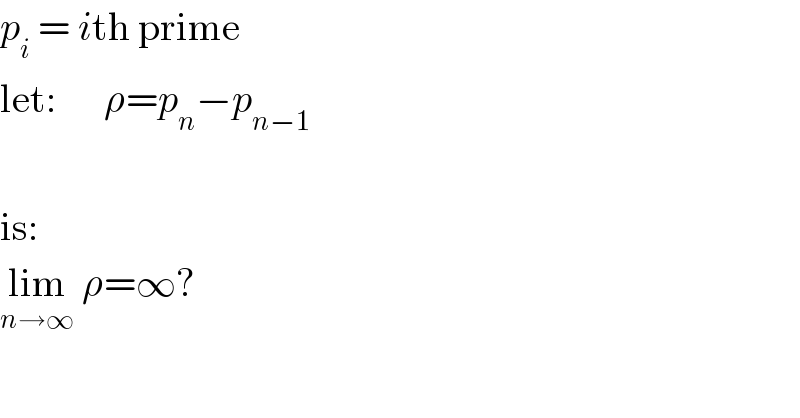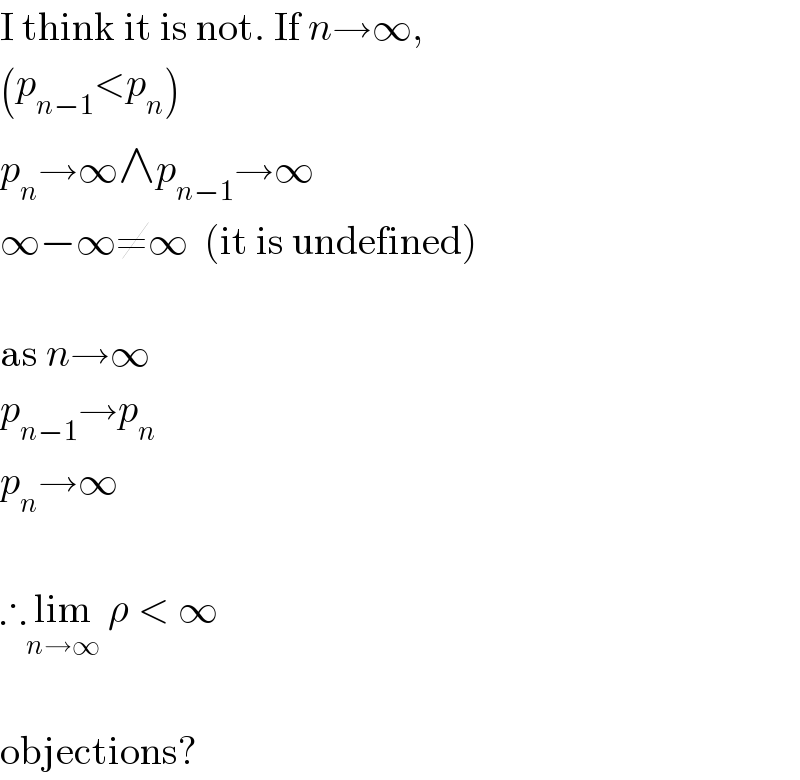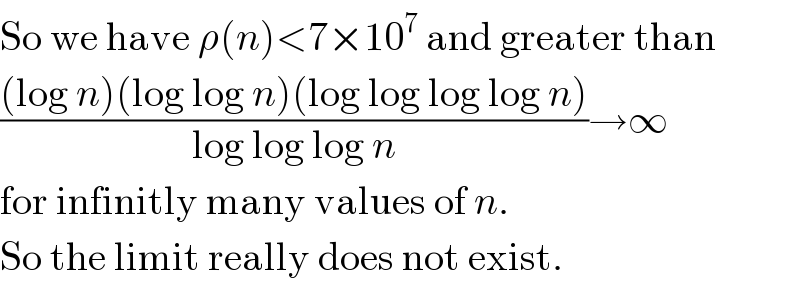
Question Number 3659 by Filup last updated on 18/Dec/15

$${p}_{{i}} \:=\:{i}\mathrm{th}\:\mathrm{prime} \\ $$$$\mathrm{let}:\:\:\:\:\:\:\rho={p}_{{n}} −{p}_{{n}−\mathrm{1}} \\ $$$$ \\ $$$$\mathrm{is}: \\ $$$$\underset{{n}\rightarrow\infty} {\mathrm{lim}}\:\rho=\infty? \\ $$
Commented by Filup last updated on 18/Dec/15

$$\mathrm{I}\:\mathrm{think}\:\mathrm{it}\:\mathrm{is}\:\mathrm{not}.\:\mathrm{If}\:{n}\rightarrow\infty, \\ $$$$\left({p}_{{n}−\mathrm{1}} <{p}_{{n}} \right) \\ $$$${p}_{{n}} \rightarrow\infty\wedge{p}_{{n}−\mathrm{1}} \rightarrow\infty \\ $$$$\infty−\infty\neq\infty\:\:\left(\mathrm{it}\:\mathrm{is}\:\mathrm{undefined}\right) \\ $$$$ \\ $$$$\mathrm{as}\:{n}\rightarrow\infty \\ $$$${p}_{{n}−\mathrm{1}} \rightarrow{p}_{{n}} \\ $$$${p}_{{n}} \rightarrow\infty \\ $$$$ \\ $$$$\therefore\underset{{n}\rightarrow\infty} {\mathrm{lim}}\:\rho\:<\:\infty \\ $$$$ \\ $$$$\mathrm{objections}? \\ $$
Commented by prakash jain last updated on 18/Dec/15

$$\mathrm{prime}\:\mathrm{gap}\:{g}\left({n}\right) \\ $$$$\mathrm{Prime}\:{g}\left({n}\right)\gg\frac{\left(\mathrm{log}\:{n}\right)\left(\mathrm{log}\:\mathrm{log}\:{n}\right)\left(\mathrm{log}\:\mathrm{log}\:\mathrm{log}\:\mathrm{log}\:{n}\right)}{\mathrm{log}\:\mathrm{log}\:\mathrm{log}\:{n}} \\ $$$$\mathrm{so}\:\mathrm{lim}\:{n}\rightarrow\infty\:{g}\left({n}\right)\:\mathrm{should}\:\mathrm{be}\:\mathrm{infinity}. \\ $$
Commented by 123456 last updated on 18/Dec/15

$$\mathrm{what}\:\mathrm{about}\:\mathrm{twins}\:\mathrm{prime} \\ $$$$\mathrm{its}\:\mathrm{look}\:\mathrm{like} \\ $$$$\underset{{n}\rightarrow\infty} {\mathrm{lim}sup}\:\rho=\infty \\ $$$$\underset{{n}\rightarrow\infty} {\mathrm{lim}inf}\:\rho=\mathrm{2}\:\left(\mathrm{if}\:\mathrm{exists}\:\mathrm{infinite}\:\mathrm{twins}\:\mathrm{prime}\right) \\ $$
Commented by prakash jain last updated on 18/Dec/15

$$\mathrm{It}\:\mathrm{has}\:\mathrm{been}\:\mathrm{proven}. \\ $$$$\underset{{n}\rightarrow\infty} {\mathrm{lim}inf}\:\rho<\mathrm{7}\centerdot\mathrm{10}^{\mathrm{7}} \: \\ $$$$\mathrm{It}\:\mathrm{only}\:\mathrm{means}\:\mathrm{that}\:\mathrm{are}\:\mathrm{infinitely}\:\mathrm{many}\:\rho \\ $$$$\mathrm{that}\:\mathrm{are}\:\mathrm{less}\:\mathrm{than}\:\mathrm{7}\centerdot\mathrm{10}^{\mathrm{7}} . \\ $$$$\mathrm{What}\:\mathrm{is}\:\mathrm{the}\:\mathrm{value}\:\mathrm{of}\:\mathrm{limit}\:\mathrm{on}\:\mathrm{the}\:\mathrm{lower}\:\mathrm{bound} \\ $$$$\mathrm{the}\:\mathrm{function}\:\mathrm{that}\:\mathrm{I}\:\mathrm{took}.\:\mathrm{I}\:\mathrm{did}\:\mathrm{not}\:\mathrm{calculate} \\ $$$$\mathrm{the}\:\mathrm{limit}\:\mathrm{just}\:\mathrm{assumed}\:\mathrm{it}. \\ $$
Commented by prakash jain last updated on 18/Dec/15

$$\mathrm{The}\:\mathrm{limit}\:\mathrm{of}\:\mathrm{the}\:\mathrm{lower}\:\mathrm{bound}\:\mathrm{function}\:\mathrm{is} \\ $$$$\mathrm{infinity}. \\ $$
Commented by prakash jain last updated on 18/Dec/15

$$\mathrm{So}\:\mathrm{we}\:\mathrm{have}\:\rho\left({n}\right)<\mathrm{7}×\mathrm{10}^{\mathrm{7}} \:\mathrm{and}\:\mathrm{greater}\:\mathrm{than} \\ $$$$\frac{\left(\mathrm{log}\:{n}\right)\left(\mathrm{log}\:\mathrm{log}\:{n}\right)\left(\mathrm{log}\:\mathrm{log}\:\mathrm{log}\:\mathrm{log}\:{n}\right)}{\mathrm{log}\:\mathrm{log}\:\mathrm{log}\:{n}}\rightarrow\infty \\ $$$$\mathrm{for}\:\mathrm{infinitly}\:\mathrm{many}\:\mathrm{values}\:\mathrm{of}\:{n}. \\ $$$$\mathrm{So}\:\mathrm{the}\:\mathrm{limit}\:\mathrm{really}\:\mathrm{does}\:\mathrm{not}\:\mathrm{exist}. \\ $$
